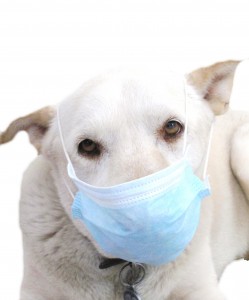
There is currently a severe outbreak of Canine Influenza Virus (CIV) in the Chicago area, on the brink of being an epidemic, which you may have seen in the news. The disease has caused more than a thousand cases and the death of at least 5 dogs from January through March (as reported by the Chicago Tribune). Chicago Tribune: Canine Influenza Article and Video
Canine flu is not as common as many other viruses in dogs that you are used to hearing about. So, what is it?
- It is a virus and a contagious respiratory disease that has affected thousands of dogs in the United States. It is a relatively new virus, which is why you may not have heard much about it. Remember the outbreak in Florida racing greyhounds with a new respiratory disease in 2004? That was Canine Influenza Virus. Then in 2005, outbreaks began occurring in boarding facilities and others involving pet dogs throughout the nation. It is thought that it may have gotten started in the greyhounds due to the mutation of the equine flu virus and exposing those greyhounds in the racetrack environment.
- It does not appear to be contagious to humans, or at least no cases have been reported of CIV in humans.
- Because it is a virus, there is no specific treatment, other than supportive care and treatment for secondary bacterial infections (similar to treatment of the flu in humans).
- It is one of the viral causes of infectious tracheobronchitis (kennel cough).
- Symptoms include coughing, sneezing, sometimes a fever, runny nose with eventual mucopurulent discharge, tachypnea/breathing harder than normal, decreased appetite, and lethargy or depression. Some dogs may also have sub-clinical infection and never show symptoms.
- Most dogs fight the infection between 1-3 weeks. Hospitalization is required for development of pneumonia, high fever, or other issues.
- Dogs with CIV should be kept isolated from other dogs for 2 weeks.
- Dogs may shed the virus even before clinical symptoms start, meaning they may have already exposed other dogs to the virus before they are acting sick.
- Veterinarians and technicians/hospital workers should wear protective clothing, including gowns and gloves, when caring for infected dogs. Hand-washing is always one of the most important ways to prevent spread of any disease.
In general CIV is very treatable and dogs typically recover when they are diagnosed and treated as quickly as possible. In immune-compromised animals, the disease is more serious as the immune system has a harder time fighting the virus and these animals are more susceptible to pneumonia and other complicating factors. There is a vaccine available. Although not a core vaccine, it should be considered for higher risk pets (boarding, going to the dog park, or traveling to areas with outbreaks or higher incidence of the disease).


